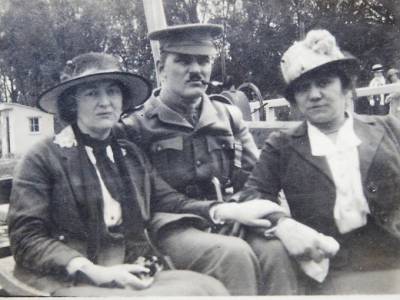Ruth M-P during World War I
 Ruth (on left) with her cousin Max Barton when he was in London recovering from being wounded at Gallipoli. The other woman is a Mrs Harrison.1)
Ruth (on left) with her cousin Max Barton when he was in London recovering from being wounded at Gallipoli. The other woman is a Mrs Harrison.1)
During World War I, Ruth worked in the Voluntary Aid Detachment (VAD). Initially her letters were enthusiastic about the 'wonderful' English, 'such bravery & such spirits', but the war work she and Dorothy did, along with caring for their invalid mother, left them - even in December 1914 - feeling old and worn out. Instead of attending a dance on Christmas Eve, they found their mother's sick room 'an excuse & a haven'.2) Ruth's work as a VAD was far from glamorous: for much of 1915 she worked at St Mary's Red Cross Hospital, Duxhurst, Reigate in Surrey cleaning the nurses' rooms and corridors in the nurses' lodge.3) In between stints there, she worked at the canteen at Waterloo Station. She wrote to Rosie that the nurses grumbled too much, but that she admired the VADs who were 'keen & enthusiastic, sporting & intelligent & with very decided opinions'. Nevertheless, she defined herself as an Australian girl and different: 'English girls are moulded & rather conventional aren't they?' Ruth also appreciated that she had it much easier than women who had to earn their living: 'I can go when I like … & [know] that I'm just doing the dirty work for my country & for my poor soldiers.' For all her criticism of the nurses she worked with, she appreciated the difficulty of their work. When she passed her first aid test in June 1915, she wrote to Rosa that she was now 'qualified to give first aid to the injured - poor injured!'4)
In 1915, Ruth wrote that the British soldiers liked to come to the Anzac facilities to see men treated equally with 'no class restrictions'. She was convinced that there would be less discipline problems in the British army if they were put on their honour and treated like Australian soldiers were. She deplored Australian soldiers taking commissions in the English army - Australians, she wrote, need our own army and own leaders and generals. By March 1915, Ruth was unwell with the painful nerve disorder neuralgia, but continued to work because 'it's work I can do & work that is necessary … [she was] not much good at nursing but I can make tea & coffee & cut sandwiches & make cakes.' By January 1916, she was sick of the more aristocratic VADs: 'Oh those … aristocrats! How fussy & idiotic they are & how un-understanding'. Ruth gave an example: when one aristocratic VAD supervisor was told there was no water to make the men cups of tea, she told them to make cups of coffee instead! Ruth appreciated it was funny, but she was 'tired, angry & democratic & glad - furiously glad that I am a plebeian.' She went further: 'I'm a Red Republican - I'm a Socialist - I'm an Anarchist when I'm with these women … I loathe class' and people who never do 'dirty work' and patronised the men. She was convinced that the Australian soldier was different to his British counterpart: 'Our soldiers are men. You see that they haven't been under the class system …' but still, so many had experienced horrors that had left them 'sick & bitter'.5)
From May 1917 Ruth was excited to be one of seven Australian women to run a YWCA canteen for the Australian Infantry in France; she would later write that she missed the work dreadfully.6) One soldier visited the canteen at Rouelles near Le Havre. He was a keen (ok, fanatical) chess player and ruefully remembered patronisingly agreeing to play a game of chess with her. After he had been decisively beaten a number of times, he realised he had to play the very best he could if he had any chance of winning. Ruth could, he wrote, stand for the goddess of chess, Caissa herself.7) Her experience at the canteen reinforced her dislike of the rigidity of the British class system. In October 1917 Ruth wrote that the Australian army 'had an exceeding hard & bitter path ahead', mostly because the men were too thoughtful and intelligent for the 'fetish' of blind obedience'.8) Writing from the YWCA canteen in France a month later, she referred to her 'socialist blood boil[ing] red' due to injustice, and described herself in a way that showed she did not share her father's concern to re-establish the family's gentry status: 'me, the red-blooded plebeian me'.9)
Her war work did not end with the war. In Christmas 1918 she was still in France, helping YMCA officers organise entertainment for the soldiers. She was described at one of three women living in “Mildura Hut”.10)